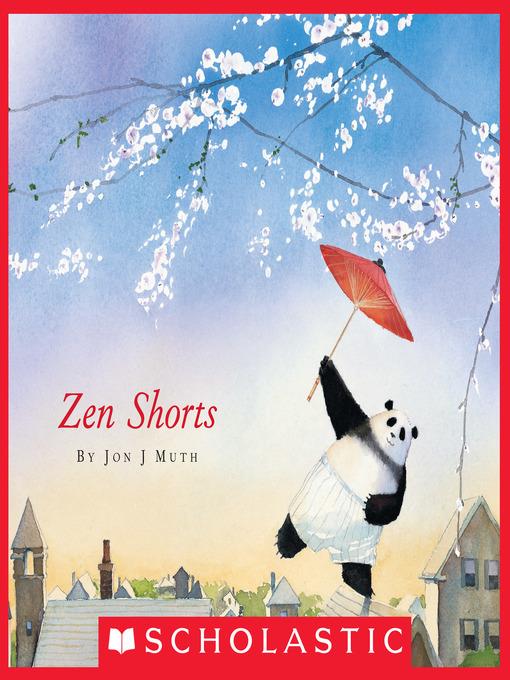
Zen Shorts
Stillwater the Panda
فرمت کتاب
ebook
تاریخ انتشار
2015
Lexile Score
540
Reading Level
0-2
ATOS
2.9
Interest Level
K-3(LG)
نویسنده
Jon J. Muthناشر
Scholastic Inc.شابک
9780545825740
کتاب های مرتبط
- اطلاعات
- نقد و بررسی
- دیدگاه کاربران
نقد و بررسی

haoan - I read this book when I was in third grade. It was a very cute book about pandas. I started liking pandas because of one book, and I liked them even more when I read this book!

February 28, 2005
Muth, who has retold traditional stories such as Stone Soup
and Tolstoy's The Three Questions
, and played up their spiritual elements with his elegant watercolors, here introduces three Zen stories from Japan. He frames the trio of tales within the context of a suburban household. Three siblings befriend a giant panda when his red umbrella blows into their yard. Speaking "with a slight panda accent," he introduces himself as Stillwater, and charms Addy and Michael—though Karl, the youngest, is still "shy around bears he know." Each day one of the children goes to visit Stillwater, revealing something of him- or herself. The panda chooses an appropriate Zen fable for each child, illustrated with rough-edged, Chinese-style brush-and-ink paintings on duotone pages, to play up the story-within-a-story structure. In the first, Stillwater tells Addy about his Uncle Ry, who disarms a robber by treating him like a guest (older readers will pick up from the closing author's note that "Uncle Ry" is shorthand for the Zen hermit Ryokan Taigu). In the next, a wise farmer demonstrates that good luck can quickly turn to bad luck and back again (a tale Ed Young also retold in The Lost Horse
). In the last, a monk learns how to stop brooding and live in the present. Readers will fall easily into the rhythm of visits to Stillwater and his storytelling sessions, and many more will fall in love with the panda, whose shape and size offer the children many opportunities for cuddling. Ages 4-up.

February 1, 2005
K-Gr 4 -Beautifully illustrated in two distinct styles, this book introduces readers to a Zen approach to the world, wrapped in a story about three siblings and their new neighbor, a panda. One by one, the children visit Stillwater, enjoying his company and listening to him tell a brief tale that illustrates a Zen principle. Each time, there is a link between the conversation shared by Stillwater and his visitor and the story he tells; it's somewhat tenuous in regard to the two older siblings, quite specific in the case of Karl, the youngest. The tales invite the children to consider the world and their perceptions from a different angle; for Karl, the panda's story gently but pointedly teaches the benefits of forgiveness. Richly toned and nicely detailed watercolors depict the "real world" scenes, while those accompanying the Zen lessons employ black lines and strokes on pastel pages to create an interesting blend of Western realism and more evocative Japanese naturalism. Taken simply as a picture book, "Zen Shorts" is interesting and visually lovely. As an introduction to Zen, it is a real treat, employing familiar imagery to prod children to approach life and its circumstances in profoundly "un-Western" ways. An author's note discusses the basic concept of Zen and details the sources of Stillwater's stories. Appealing enough for a group read-aloud, but also begging to be shared and discussed by caregiver and child, "Zen Shorts" is a notable achievement." -Coop Renner, Hillside Elementary, El Paso, TX"
Copyright 2005 School Library Journal, LLC Used with permission.

Starred review from March 1, 2005
K-Gr. 3. Like " The Three Questions" (2002), Muth's latest is both an accessible, strikingly illustrated story and a thought-provoking meditation. Here he incorporates short Buddhist tales, "Zen Shorts," into a story about three contemporary children. One rainy afternoon, a giant panda appears in the backyard of three siblings. Stillwater, the Panda, introduces himself, and during the next few days, the children separately visit him. Stillwater shares an afternoon of relaxing fun with each child; he also shares Zen stories, which give the children new views about the world and about each other. Very young listeners may not grasp the philosophical underpinnings of Stillwater's tales, but even kids who miss the deeper message will enjoy the spare, gentle story of siblings connecting with one another. Lush, spacious watercolors of charming Stillwater and the open neighborhood will entrance children, as will the dramatic black-and-white pictures of the comical animal characters that illustrated Stillwater's Zen stories. Muth doesn't list sources for the tales, but his author's note offers more commentary about Zen. Stillwater's questions will linger (Can misfortune become good luck? What is the cost of anger?), and the peaceful, uncluttered pictures, like the story itself, will encourage children to dream and fill in their own answers.(Reprinted with permission of Booklist, copyright 2005, American Library Association.)

























دیدگاه کاربران